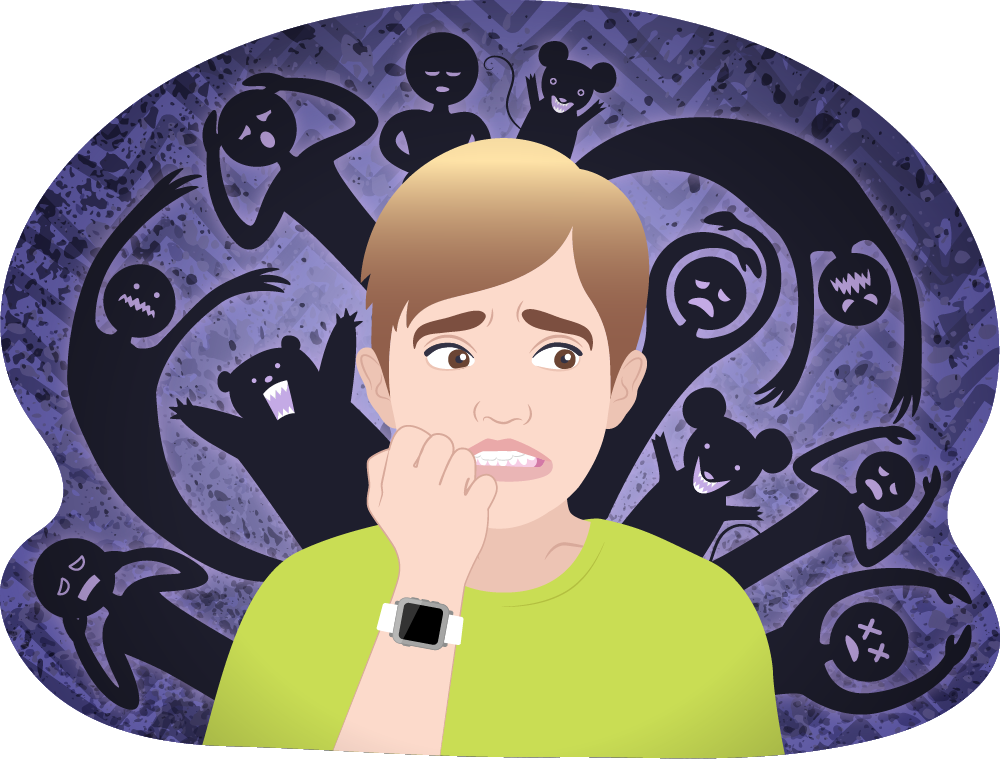Your brain when you're anxious
The brain is very complex! But let’s simplify things a bit, ...
READ MEMost people have experienced anxiety, but not everybody has an anxiety disorder. Let’s look at the difference.

"Anxiety disorders can only be diagnosed by a GP, psychologist, psychiatrist or other medical professional. Kids Helpline counsellors cannot diagnose you with an anxiety disorder."
– Amanda, Kids Helpline Counsellor
Panic Disorder can involve having ‘panic attacks’. A panic attack is an intense fear that grows and peaks within a few minutes and has physical symptoms that might include:
Chills
Feeling very tired
Sweating
Chest pain
Hot flushes
Fear you are dying
Numbness/tingling
Trembling/shaking
Feeling short of breath
Fear of losing control
Fear of 'going crazy'
Feeling detached from yourself
Feeling like you are choking
Nausea or stomach/digestion issues
Sense of ‘unreality’/things feel ‘surreal’
Heart palpitations or rapid heartbeat
"People have described panic attacks as feeling like an asthma attack or even a heart attack! Panic attacks can affect anyone. If they are rare or a one-off, they are not considered a panic disorder.
A panic disorder is where for one month or more, you might have one or more panic attacks, are frightened about having more future panic attacks, spend time thinking and worrying about the attacks and change your behaviours related to the attacks."
– Amanda, Kids Helpline Counsellor
Have you ever had a panic attack or an anxiety attack?
Learn more about how and why they happen!
To be diagnosed with Agoraphobia, you must have two or more of the following fears/anxieties:
These fears are out of proportion to the actual danger and cause a lot of distress. They also last six months or more.
People with Agoraphobia may become isolated, be frightened of being alone, become dependent on others, avoid going out or even refuse to leave the house.
Some people with Agoraphobia have panic attacks or even a Panic Disorder as well.
"In high school I was diagnosed with anxiety, depression and agoraphobia which is a phobia of being in places where you can feel trapped or embarrassed."
Social anxiety can be caused by lots of different things and these causes can be complex. These simple facts about the brain may help explain why social anxiety occurs.
Humans are social creatures – throughout our history, we have been dependent on other people to survive. Because of this, we are born with a fear of being abandoned
As we get older, we start to fear being rejected by others – rejection can lead to abandonment
This can manifest as a fear of being judged or a fear of shame/embarrassment, which may contribute to social anxiety
Like many other anxiety disorders, Phobias are out of proportion to the actual danger their fear poses. This means that someone is intensely afraid of a mouse (for example), even though they know intellectually that a mouse wouldn’t hurt them and would likely run away from them. Also like other anxiety disorders, Phobias result in distress and avoiding the situation. They also usually last six months or more.
Some examples of OCD can include:
The obsessions/compulsions are time-consuming (take up more than one hour per day), disrupt your everyday life and cause distress.
If you want to learn more about anxiety and how to deal with it, give us a call, start a WebChat or send us an email today.
If you need more information for other digital services and resources, check out Head to Health.
Your brain when you're anxious
The brain is very complex! But let’s simplify things a bit, ...
READ MEObsessive Compulsive Disorder (OCD)
Let’s look at what OCD is and explore how to cope ...
READ MEHow to manage anxiety
Anxiety can feel overwhelming, but there are some simple steps you can ...
READ MEWhy do I freak out when I’m stressed?
To work out why you're feeling anxious, it can be really helpful ...
READ METalking helps! We’re here for you.
No problem is too big or too small.
We're here 24 hours a day, 7 days a week